

Commentary Select
Commentary Select




Interpretation: Psalms (INT)

Interpretation: Psalms (INT)
The Psalms have been at the center of Christian faith and piety for centuries. Now, one of the foremost interpreters of the Psalms explores how they can still claim that place today. In this commentary, James L. Mays sets forth what the Psalms say about God, creation, humanity, and the life of faith. Mays proceeds with an awareness that the Psalms were originally composed for worship, and so he provides an understanding of the psalms as praise and prayer.
Interpretation: A Bible Commentary for Teaching and Preaching is a distinctive resource for those who interpret the Bible in the church. Planned and written specifically for teaching and preaching needs, this critically acclaimed biblical commentary is a major contribution to scholarship and ministry.
James Luther Mays (1921 - 2015) was Cyrus M. McCormick Professor Emeritus of Hebrew and Old Testament Interpretation at Union Theological Seminary in Richmond, Virginia. He was the general editor of the best-selling Interpretation: A Bible Commentary for Teaching and Preaching series, and is author of many books, including Psalms in the Interpretation series and The Lord Reigns: A Theological Handbook to the Psalms.
Interpretation: Revelation (INT)
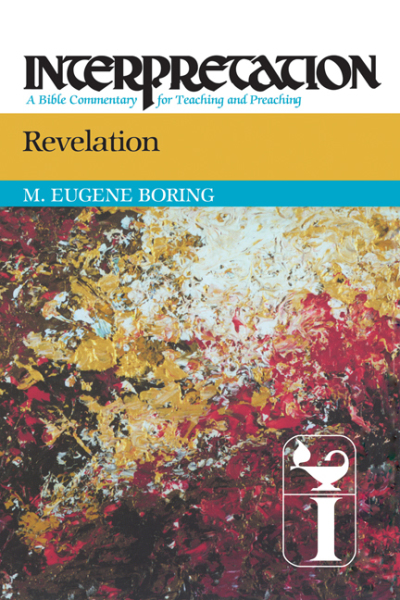
Interpretation: Revelation (INT)
Throughout the history of Christianity, the book of Revelation has had an enormous influence in religion, history, and culture, and it still has an urgently needed message for the church. M. Eugene Boring's critical assessment of Revelation enlightens readers as to just what that message is.
Interpretation: A Bible Commentary for Teaching and Preaching is a distinctive resource for those who interpret the Bible in the church. Planned and written specifically for teaching and preaching needs, this critically acclaimed biblical commentary is a major contribution to scholarship and ministry.
M. Eugene Boring is I. Wylie Briscoe Professor of New Testament Emeritus at Brite Divinity School, Texas Christian University. He is the author of numerous books on the New Testament, including An Introduction to the New Testament, Mark from the New Testament Library series, and Revelation from the best-selling Interpretation series, all published by Westminster John Knox Press.
Interpretation: Romans (INT)
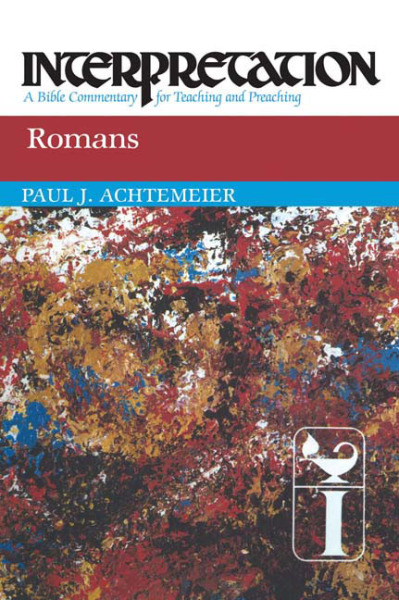
Interpretation: Romans (INT)
In the pages of this commentary volume, Paul J. Achtemeier undertakes a fresh reading of the Paul's letter to the Romans for guidance in teaching and preaching, as well as for guidance in the reader's personal life. Paul's letter to the Romans is unabashedly theological, therefore the comments will have theology as their primary concern. Called into question by what Paul writes, the reader will understand what Paul is about and why he is useful to the contemporary tasks of preaching God's grace to modern people and teaching them the ways of God with humankind.
Interpretation: A Bible Commentary for Teaching and Preaching is a distinctive resource for those who interpret the Bible in the church. Planned and written specifically for teaching and preaching needs, this critically acclaimed biblical commentary is a major contribution to scholarship and ministry.
Paul J. Achtemeier is Professor Emeritus of Biblical Interpretation at Union Theological Seminary and Presbyterian School of Christian Education in Richmond, Virginia. He is coeditor of the popular series, Interpretation: A Bible Commentary for Teaching and Preaching.
Interpretation: Ruth (INT)

Interpretation: Ruth (INT)
The narrative of the book of Ruth is a drama of ordinary human life, but the drama unfolds against a background of the providence and purposes of God. Katharine Doob Sakenfeld has written a commentary that makes very clear why the book of Ruth has such great importance as literature and as Scripture.
Interpretation: A Bible Commentary for Teaching and Preaching is a distinctive resource for those who interpret the Bible in the church. Planned and written specifically for teaching and preaching needs, this critically acclaimed biblical commentary is a major contribution to scholarship and ministry.
Katharine Doob Sakenfeld is Eisenberger Professor Emerita of Old Testament and Co-Coordinator of Princeton Seminary Women in Ministry Initiative. She served for forty-three years on the Princeton Seminary faculty, including twenty-five years as Director of PhD Studies. Focusing on feminist biblical interpretation, especially in diverse cultural contexts, she helped to establish the first Princeton Theological Seminary course in women's studies and continues to foster a worldwide network of women biblical scholars. In 2007 she was elected President of the Society of Biblical Literature. An ordained minister in the Presbyterian Church (U.S.A.), she received the 2016 PCUSA award for Excellence in Theological Education. Her publications include Ruth in the esteemed Interpretation series and Just Wives?: Stories of Power and Survival in the Old Testament and Today, both published by Westminster John Knox Press. She was General Editor for the five-volume New Interpreter's Dictionary of the Bible.
Interpretation: Second Corinthians (INT)
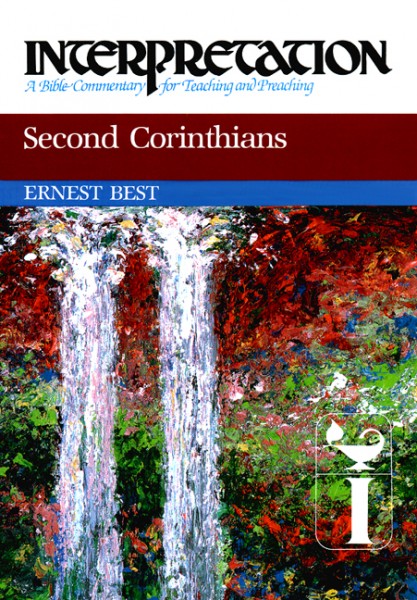
Interpretation: Second Corinthians (INT)
Ernest Best reminds us in his introduction to his Second Corinthians commentary volume that letters are one of the easiest ways of unintentionally concealing information. The writer and the intended readers share knowledge about what is going on that outsiders do not posess. This is even more true for a letter that deals with the inner problems of a group of people; the members know the situation and do not need it recalled. We, as third-party readers of Second Corinthians, cannot expect to understand all that Paul writes there. But we can see enough to gain insight into the way pastoral responsibilities should be excercised, and how Christian communities should behave.
Interpretation: A Bible Commentary for Teaching and Preaching is a distinctive resource for those who interpret the Bible in the church. Planned and written specifically for teaching and preaching needs, this critically acclaimed biblical commentary is a major contribution to scholarship and ministry.
Ernest Best (1917-2004) was Professor of Divinity and Biblical Criticism at the University of Glasgow in Scotland.
Interpretation: Song of Songs (INT)

Interpretation: Song of Songs (INT)
Robert Jenson offers a systematic theologian's careful reading of the Song of Songs. Jenson focuses on the overt sense of the book as an erotic love poem in order to discover how this evocative poetry solicits a theological reading. Jenson finds a story of human love for God in this complex poetic book and offers a commentary that elucidates and inspires.
Interpretation: A Bible Commentary for Teaching and Preaching is a distinctive resource for those who interpret the Bible in the church. Planned and written specifically for teaching and preaching needs, this critically acclaimed biblical commentary is a major contribution to scholarship and ministry.
Robert W. Jenson is Senior Scholar for Research at the Center for Theological Inquiry in Princeton, New Jersey, and Professor Emeritus of Religion at St. Olaf College in Northfield, Minnesota.
Isaiah 1-35 (Preacher's Outline & Sermon Bible Series)
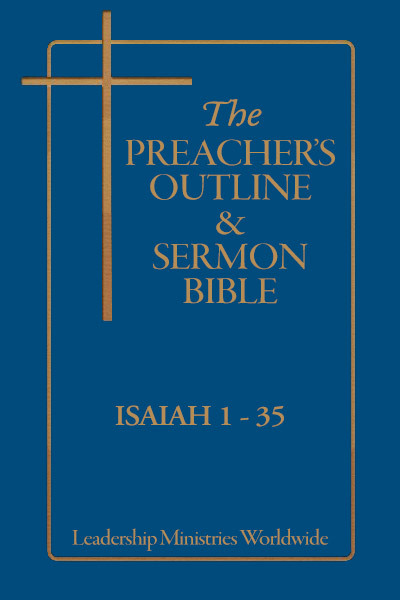
Isaiah 1-35 (Preacher's Outline & Sermon Bible Series)
The Preacher’s Outline & Sermon Bible® (POSB) is a practical and comprehensive commentary set that gives the pastor or teacher everything they need to preach or teach God’s Word. Covering every book of the Bible, POSB is the perfect resource for expository or topical teaching.
With over a million copies sold in print, POSB is unlike any other commentary you will encounter. Each volume gives you detailed, verse-by-verse exposition for every Bible passage. Along with the biblical commentary, POSB includes extensive outlines with sub-points, thoughts on practical application, deeper studies on key biblical topics and themes, and full cross references.
You will quickly see the added value and ease of use that comes with having this commentary in your Olive Tree library. The Olive Tree edition separates the outlines and commentary to make POSB even easier to use. Instead of scrolling back and forth (or flipping pages), you can see the commentary and outlines side-by-side as you study or prepare your sermon. POSB is also fully functional with the Resource Guide and is configured to help you get to the information you need quickly. You can both drill down to the verse you want to study and easily find all the introductory material on each book of the Bible.
The Preacher’s Outline and Sermon Bible makes it easy to create life-changing sermons and lessons. Everything you need to understand any passage of the Bible is right at your fingertips. And this resource is not just for preachers and teachers; it’s perfect for any Christian who wants to know God’s Word better.
POSB features include:
- Detailed outlines for every book of the Bible
- Well researched and easy to read commentary
- Practical application for godly living
- Deeper studies to dive into key topics and themes
- Full text cross references (no need to look them up)
Isaiah 1-39: Ancient Christian Commentary on Scripture (ACCS)

Isaiah 1-39: Ancient Christian Commentary on Scripture (ACCS)
The Ancient Christian Commentary on Scripture does what very few of today's students of the Bible could do for themselves. With the aid of computer technology, the vast array of writings from the church fathers—including much that is available only in the ancient languages—have been combed for their comment on Scripture. From these results, scholars with a deep knowledge of the fathers and a heart for the church have hand-selected material for each volume, shaping, annotating and introducing it to today's readers. Each portion of commentary has been chosen for its salient insight, its rhetorical power and its faithful representation of the consensual exegesis of the early church.
The Ancient Christian Commentary on Scripture is an ecumenical project, promoting a vital link of communication between the varied Christian traditions of today and their common ancient ancestors in the faith. On this shared ground, we listen as leading pastoral theologians of seven centuries gather around the text of Scripture and offer their best theological, spiritual and pastoral insights.
Today the historical-critical method of interpretation has nearly exhausted its claim on the biblical text and on the church. In its wake there is a widespread yearning among Christian individuals and communities for the wholesome, the deep and the enduring. The Ancient Christian Commentary on Scripture does not seek to replace those excellent commentaries that have been produced in the twentieth century. Rather, it supplements them, framing them with interpretive voices that have long sustained the church and only recently have fallen silent. It invites us to listen with appreciative ears and sympathetic minds as our ancient ancestors in the faith describe and interpret the scriptural vistas as they see them.
The Ancient Christian Commentary on Scripture is a postcritical revival of the early commentary tradition known as the glossa ordinaria, a text artfully elaborated with ancient and authoritative reflections and insights. An uncommon companion for theological interpretation, spiritual reading, and wholesome teaching and preaching.
About the Isaiah 1-39 volume:
For to us a child is born,
to us a son is given;
and the government will be upon his shoulder
and his name shall be called
Wonderful Counselor, Mighty God,
Everlasting Father, Prince of Peace.
For the early church fathers the prophecy of Isaiah was not a compendium of Jewish history or theology but an announcement of the coming Messiah fulfilled in the life and ministry of Jesus of Nazareth. As such, the prophet's words were a rich source of theological reflection concerning their Lord and a vital aid in their defense against the objections of the Jews that Jesus was the promised Messiah. The interpretation of Jesus' ministry in light of Isaiah's prophecy was not a theological innovation on their part, but rather a following of the path blazed by the New Testament writers and Jesus himself.
Among passage-by-passage commentaries cited here are those by Eusebius of Caesarea, Jerome, Cyril of Alexandria and Theodoret of Cyr, as well as one attributed to Basil of Caesarea. John Chrysostom preached a series of homilies on Isaiah of which most of those extant concern the first eight chapters, though Chrysostom frequently cites Isaiah in numerous homilies on other books. Augustine of Hippo, Gregory the Great and Bede the Venerable frequently cited passages from Isaiah 1—39 as did many other fathers in defending the Christian faith from Jewish critics.
Edited by Steven A. McKinion, this volume of the Ancient Christian Commentary on Scripture offers readers access to materials ranging from East to West and from the first through the eighth centuries, some appearing in English translation for the first time. Within this treasure house are riches to illumine the mind and fire the heart.
Isaiah 36-66 (Preacher's Outline & Sermon Bible Series)
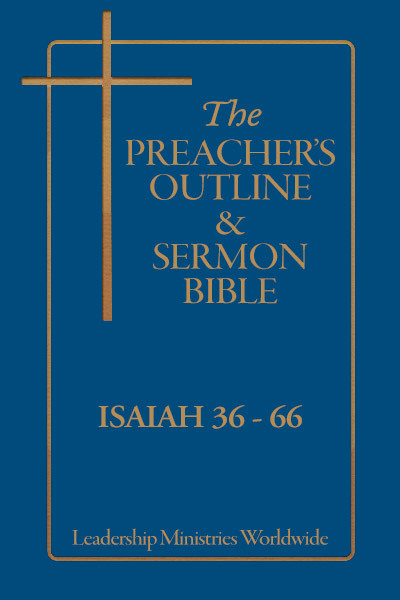
Isaiah 36-66 (Preacher's Outline & Sermon Bible Series)
The Preacher’s Outline & Sermon Bible® (POSB) is a practical and comprehensive commentary set that gives the pastor or teacher everything they need to preach or teach God’s Word. Covering every book of the Bible, POSB is the perfect resource for expository or topical teaching.
With over a million copies sold in print, POSB is unlike any other commentary you will encounter. Each volume gives you detailed, verse-by-verse exposition for every Bible passage. Along with the biblical commentary, POSB includes extensive outlines with sub-points, thoughts on practical application, deeper studies on key biblical topics and themes, and full cross references.
You will quickly see the added value and ease of use that comes with having this commentary in your Olive Tree library. The Olive Tree edition separates the outlines and commentary to make POSB even easier to use. Instead of scrolling back and forth (or flipping pages), you can see the commentary and outlines side-by-side as you study or prepare your sermon. POSB is also fully functional with the Resource Guide and is configured to help you get to the information you need quickly. You can both drill down to the verse you want to study and easily find all the introductory material on each book of the Bible.
The Preacher’s Outline and Sermon Bible makes it easy to create life-changing sermons and lessons. Everything you need to understand any passage of the Bible is right at your fingertips. And this resource is not just for preachers and teachers; it’s perfect for any Christian who wants to know God’s Word better.
POSB features include:
- Detailed outlines for every book of the Bible
- Well researched and easy to read commentary
- Practical application for godly living
- Deeper studies to dive into key topics and themes
- Full text cross references (no need to look them up)
Isaiah 40-66: Ancient Christian Commentary on Scripture (ACCS)

Isaiah 40-66: Ancient Christian Commentary on Scripture (ACCS)
The Ancient Christian Commentary on Scripture does what very few of today's students of the Bible could do for themselves. With the aid of computer technology, the vast array of writings from the church fathers—including much that is available only in the ancient languages—have been combed for their comment on Scripture. From these results, scholars with a deep knowledge of the fathers and a heart for the church have hand-selected material for each volume, shaping, annotating and introducing it to today's readers. Each portion of commentary has been chosen for its salient insight, its rhetorical power and its faithful representation of the consensual exegesis of the early church.
The Ancient Christian Commentary on Scripture is an ecumenical project, promoting a vital link of communication between the varied Christian traditions of today and their common ancient ancestors in the faith. On this shared ground, we listen as leading pastoral theologians of seven centuries gather around the text of Scripture and offer their best theological, spiritual and pastoral insights.
Today the historical-critical method of interpretation has nearly exhausted its claim on the biblical text and on the church. In its wake there is a widespread yearning among Christian individuals and communities for the wholesome, the deep and the enduring. The Ancient Christian Commentary on Scripture does not seek to replace those excellent commentaries that have been produced in the twentieth century. Rather, it supplements them, framing them with interpretive voices that have long sustained the church and only recently have fallen silent. It invites us to listen with appreciative ears and sympathetic minds as our ancient ancestors in the faith describe and interpret the scriptural vistas as they see them.
The Ancient Christian Commentary on Scripture is a postcritical revival of the early commentary tradition known as the glossa ordinaria, a text artfully elaborated with ancient and authoritative reflections and insights. An uncommon companion for theological interpretation, spiritual reading, and wholesome teaching and preaching.
About the Isaiah 40-66 volume:
No book of the Old Testament is more frequently quoted in the New than Isaiah, and no portion of Isaiah is more frequently quoted in the New than the typologically fertile soil of Isaiah 40-66. Still, as interpreted by the fathers, Isaiah presents a message that is far more soteriological than christological, leading readers to a deeper understanding of God's judgment and salvation. Isaiah 40-66 provides us with the closest thing the Old Testament has to offer regarding a systematic theology.
The excerpts included in this volume offer us a rich array of differing styles, principles and theological emphases from Theodoret of Cyr to Eusebius and Procopius, to Cyril of Alexandria, Jerome and Augustine. Readers will be enriched by the wide-ranging selections, some of which are translated here into English for the first time.
Isaiah, Jeremiah, Lamentations: Cornerstone Biblical Commentary

Isaiah, Jeremiah, Lamentations: Cornerstone Biblical Commentary
Elmer A. Martens, PhD, is professor emeritus of Old Testament and president emeritus at Mennonite Brethren Biblical Seminary (Fresno, California), where he has taught for over 30 years. He is the author of God's Design, A Focus on Old Testament Theology, and a commentary on Jeremiah (Herald Press). He was coeditor of The Flowering of Old Testament Theology and served for several years as the editor of the journal Direction.
Larry L. Walker, PhD, held a professional teaching career with time split between Southwestern Baptist Theological Seminary and Mid-America Baptist Seminary. Since his retirement in 1998, he has done adjunct teaching at several seminaries. He authored a commentary on Zephaniah for the Expositor's Bible Commentary and is also a contributor to the New International Dictionary of Old Testament Theology and Exegesis.
Isaiah: Bible Speaks Today (BST)
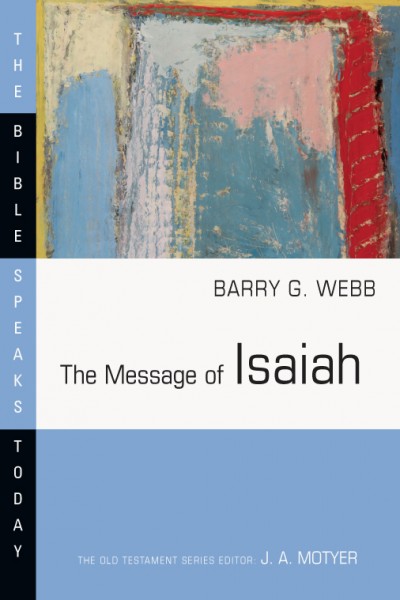
Isaiah: Bible Speaks Today (BST)
Ever since Jesus read from the scroll of Isaiah in the synagogue of Nazareth, Christians have gravitated to this great prophecy as the interpretive center of the Old Testament. Here the story of Israel, scourged by judgment and exile and hopeful of restoration, is framed by its witnesses, heaven and earth. How will Israel be brought through its school of suffering and be propelled toward its divine destiny as the vanguard of a new heaven and earth? In the visionary world of Isaiah, the varied themes and imagery of the Old Testament converge and blend to transcend their plainest meanings as they project an extraordinary climax of the story of Israel and of the world.
Barry Webb calls Isaiah the "Romans" of the Old Testament, where all the threads come together and the big picture of God's purposes for his people and for his world are most clearly set forth. Attuned to the magnificent literary architecture of Isaiah, Webb escorts us through this prophecy and trains our ears and hearts to resonate with its great biblical-theological themes.
About the Bible Speaks Today (BST) Series:
Edited by J.A. Motyer and the late John R. W. Stott, the Bible Speaks Today commentaries are characterized by what Stott called a "threefold ideal . . . to expound the biblical text with accuracy, to relate it to contemporary life and to be readable." As such, each contributor in this series is both a noted scholar and a working pastor.
The BST series, now complete, covers all sixty-six books of the bible (Old and New Testaments) in fifty-five volumes. If you preach or teach from Scripture, the Bible Speaks Today series will help you apply the timeless biblical message to the everyday experiences of your listeners. And if you study the Bible on your own, these volumes will be a helpful resource focusing on the significance of God's Word for your own life and work.
IVP New Testament Commentary Series - 1 Corinthians

IVP New Testament Commentary Series - 1 Corinthians
The church of Corinth and the issues it faced are quite similar to those of today’s churches. We face ethnic, religious, economic, and social barriers. Churches split over matters of authority, sexual practice, gender, marriage, and divorce.
Paul wrote his letter to the Corinthians to give them practical solutions to these problems. In this commentary, Alan Johnson demonstrates that at the center of these solutions is love—only Christ-centered love offers any solution to the complications of the human condition—whether now or thousands of years ago.
IVP New Testament Commentary Series - 1 Peter
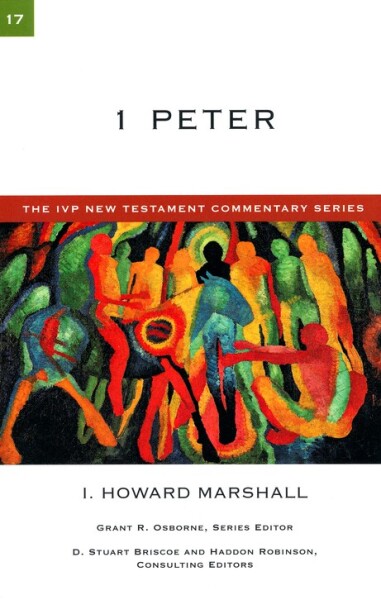
IVP New Testament Commentary Series - 1 Peter
Recipient of Christianity Today’s Critics Choice Award!
Peter’s letter encouraged his readers: not only as they endured suffering, but also as they persevered in holding fast to Christ in unbelieving and hostile world. Peter’s letter is full of practical advice for right familial and social living, not to mention for interacting with a culture that challenges those who seek and obey Christ.
This refreshing commentary from a prominent evangelical scholar, I. Howard Marshall, explains 1 Peter’s literary structure, authorship, audience, and main theological subjects, along with a detailed walkthrough that strives to illuminate both the significance of the text today and its significance for its first readers.
IVP New Testament Commentary Series - 1-2 Thessalonians

IVP New Testament Commentary Series - 1-2 Thessalonians
The end times (eschatology) intrigued the early church as much as it does today’s church.
The new church at Thessalonica, which Paul planted during his short time there, also wondered when the end might be. Paul composed two letters for them, so that they might have a fuller knowledge of the “last things.” Taken in tandem, they explain the “already-and-not-yet” nature of the “age to come.” Paul’s explanation and advice remains relevant for today’s church as well.
G.K. Beale walks us through what these letters meant to their first audience and how we can apply them to our lives.
IVP New Testament Commentary Series - 1-2 Timothy & Titus

IVP New Testament Commentary Series - 1-2 Timothy & Titus
Issues of leadership, wealth, right handling of cults, women in ministry, and even marriage as a social establishment—the very same issues faced by today’s church—are addressed by Paul in 1 & 2 Timothy and Titus. His compassionate advice to Timothy and Titus as they guide first century believers in Crete and Ephesus is advice modern churches still need when leading God’s children today.
Philip H. Towner walks us through what these letters meant to their first audience and how it applies today.
IVP New Testament Commentary Series - 1-3 John

IVP New Testament Commentary Series - 1-3 John
Divided by discord, the church John wrote his letters to greatly needed his firm instruction to rediscover Christ-centered love and unity. His letters to that church are easily adapted to modern gatherings of believers, which are often challenged by disputes –whether internal or external. In a pluralistic society, visibly holding fast to gospel truth is imperative.
Marianne Meye Thompson’s thorough commentary on John’s letters contains opening material that explains the letters’ historical context, purpose, order, theological themes, and other contextual matters. A detailed explanation then illuminates the meaning of each letter both for modern audiences and ancient ones.
IVP New Testament Commentary Series - 2 Corinthians

IVP New Testament Commentary Series - 2 Corinthians
When Paul wrote his second letter to the church in Corinth, he was addressing some of the same materialistic issues and tendencies towards decadence that assail churches today. Paul’s tactics and time-proven ministerial insights are still relevant ways of addressing these very problems.
In this thorough commentary of 2 Corinthians,Linda L. Belleville provides an introduction that explains dates of authorship and historical occasion, purpose, cultural context, theology, and other contextual matters. Belleville communicates what 2 Corinthians meant to its original audiences and how we should apply that to our lives. Students, ministers, teachers, and anyone who wants to get to know the Bible more deeply should make use of this exceptional resource.
IVP New Testament Commentary Series - 2 Peter & Jude

IVP New Testament Commentary Series - 2 Peter & Jude
In Simon Peter’s eyes, the mercy of forgiveness is, perhaps, matched only by the awe of experiencing trust after his threefold denial. That redemptive event in Peter’s life fueled profound letters—letters of caution and hope, grave counsel, and unimaginable promise.
Jude is too often ignored because of its short length and forceful content. Regardless, it is dominated by God’s love and is a source of significant instruction for the church.
In this commentary, Robert Harvey and Philip H. Towner explore the subjects of composition, canonicity, purpose, and theology. Finally, they show how all these connect for today’s church.
IVP New Testament Commentary Series - Acts
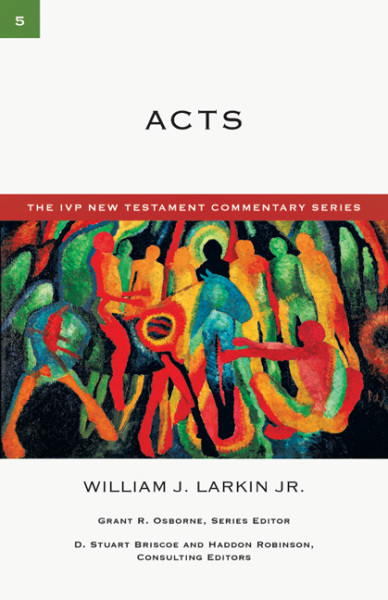
IVP New Testament Commentary Series - Acts
Following the ascension of Jesus, the strife-torn, ethnically diverse backwater of the Roman Empire known as Palestine was a hostile environment for the gospel. Despite that, the gospel flourished -- from Jerusalem to Judea, Samaria, and the rest of the known world.
In Acts, the sequel to his Gospel, Luke describes how the Holy Spirit transformed a small group of believers into a unified, world-engaging church. William Larkin’s examination of this account of the early church offers inspiration and insight for readers who wonder how the gospel may be advanced in the increasingly divided and skeptical culture of the twenty-first century.
This outstanding commentary serves students, ministers, teachers—anyone who has a desire to know Acts in a more thorough way.
IVP New Testament Commentary Series - Colossians & Philemon
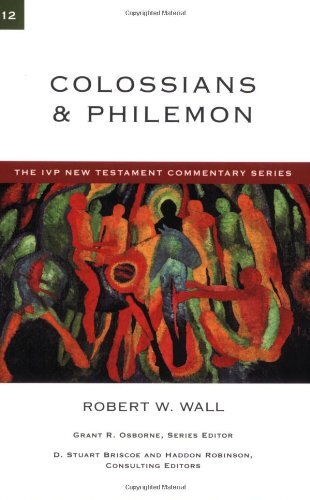
IVP New Testament Commentary Series - Colossians & Philemon
Paul’s letter to the Colossians, who were absorbed with legalism and intellectual conflicts, emphasizes the essential need for belief in Christ and the calling of all Christians to demonstrate their faith in right relationship with others. Paul’s solution to a purely individual and intellectualized faith will ease believer’s hearts and minds even today.
Philemon was an influential church leader whose slave, Onesimus, ran away. Paul wrote him a compelling, deeply personal letter, in which he asked Philemon to start a wholly fresh relationship with Onesimus. This letter gives exemplary advice on caring conflict resolution and relationships in church communities.
Robert W. Wall’s study on Colossians and Philemon contains explanations of what these letters meant to their first audiences and how to apply that meaning today.
IVP New Testament Commentary Series - Ephesians
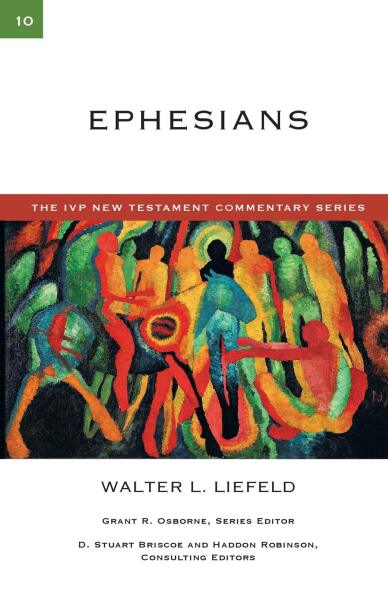
IVP New Testament Commentary Series - Ephesians
For readers who both yearn to know God more deeply and desire to know their purpose before God, Ephesians offers an overarching picture of God’s intention for His church, with Jesus Christ at the center. Paul starts out with a beautiful doxology and then exhorts the church to prove its vocal praise with action. Paul’s letter to the church in Ephesus remains powerful, moving, and transformative for Christians today.
Walter Linfield focuses both on this letter’s meaning for ancient readers and how that meaning speaks to modern readers—making this commentary an exceptional help for students, ministers, and teachers. This commentary also provides an introduction that addresses date of composition, authorship, theological themes, and context.
IVP New Testament Commentary Series - Galatians
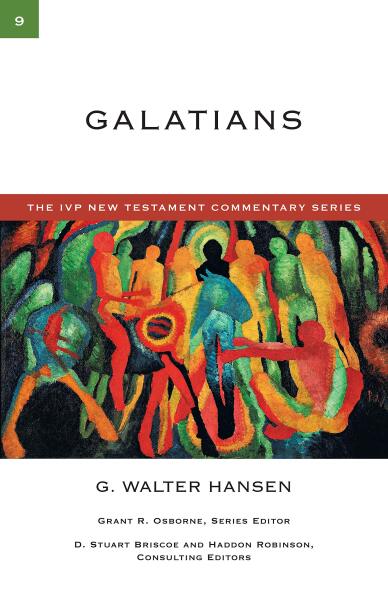
IVP New Testament Commentary Series - Galatians
Walter Hansen begins his commentary with this piercing counsel: "Wherever ethnic rivalries are destroying societies, the book of Galatians calls Christians to express the truth of the gospel in communities where there are no ethnic or social or gender divisions.” With billions of people in need of hearing the gospel, this cuts to the heart of evangelistic issues in our world today.
Hansen’s commentary stands out because he not only addresses the theology of justification by faith, but its social impact. He calls readers to move past issues of personal righteousness into concern for social justice, concern for issues of race, class, and gender—issues the church has dealt with since the time of the Galatians.
IVP New Testament Commentary Series - Hebrews

IVP New Testament Commentary Series - Hebrews
The letter to the Hebrews is one of the longest, most striking arguments for the singularity and sovereignty of Christ in the New Testament. Today’s readers will be challenged to stretch their understanding of Christ and recommit their allegiance to Him in this portrayal of our High Priest, God’s only Son—whose life showed us how to live, whose death and resurrection paid for our sins and let us be in constant relationship with God.
Written in an energetic, concise style, this work from pastor Ray C. Stedman contains vital context that allows us to see what this letter meant to its first audience and how we can apply that today, in our lives.
IVP New Testament Commentary Series - James
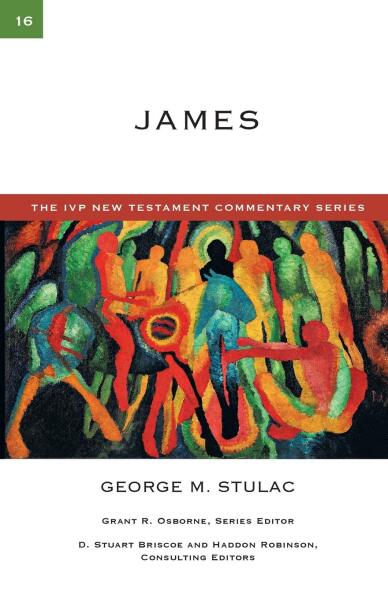
IVP New Testament Commentary Series - James
Recipient of Christianity Today’s Critics Choice Award!
What is the connection between faith and works? What does growing in faith look like? What hope do we share with those in the midst of hardships? How do we avoid becoming like the rich young man who wouldn’t give up his wealth, and how do we govern our tongues?
As an apostle of Christ, James dealt with these issues acutely. He gave solid pastoral instruction to his readers, who were dispersed and oppressed. His words to them are no less crucial for us.
This concise, caring commentary by George M. Stulac offers readers an exposition that emphasizes James’ message to his original audience and how to apply that to today’s church.
IVP New Testament Commentary Series - John
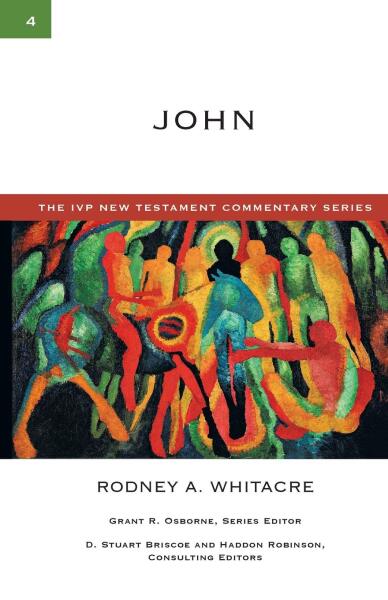
IVP New Testament Commentary Series - John
John’s purpose in the Gospel of John is two-fold: to encourage believers and to demonstrate reasons to believe and proclaim Jesus as Messiah, the divine Son of God. Both first century believers and modern Christians can be inspired by this account of the significance of Jesus’ life and teachings.
Rodney A. Whitacre’s commentary explains what John meant to its first readers and how that message applies to us today.
IVP New Testament Commentary Series - Luke

IVP New Testament Commentary Series - Luke
In Luke’s powerful account, Jesus enters Galilee, proclaiming “good news to the poor… freedom for the prisoners and recovery of sight for the blind.” The Gospel of Luke—in more detail than the other Gospels—portrays Jesus’ striking care for the “least of these”: the destitute, the afflicted, the persecuted, the outcast—even non-Israelites.
Darrel Bock’s commentary describes startling similarities between Jesus’ world and ours. Jesus ignored the worldly divisions of race, religion, and social or economic status. The early Christian church was spectacularly diverse—and Christ meant it to be so.
Bock focuses both on Luke’s meaning for ancient readers and how that meaning speaks to modern readers—making this commentary an exceptional study help.
IVP New Testament Commentary Series - Mark

IVP New Testament Commentary Series - Mark
The Gospel of Mark is generally considered to be the earliest written gospel. Only in later years have scholars searched beneath its brisk, seemingly uncomplicated surface to investigate its hidden theological elegance.
Author Ronald Kernaghan leads readers into a compelling examination of Mark as a parable—a dynamic account that challenges us to live with and learn from Jesus Christ all our lives.
IVP New Testament Commentary Series - Matthew
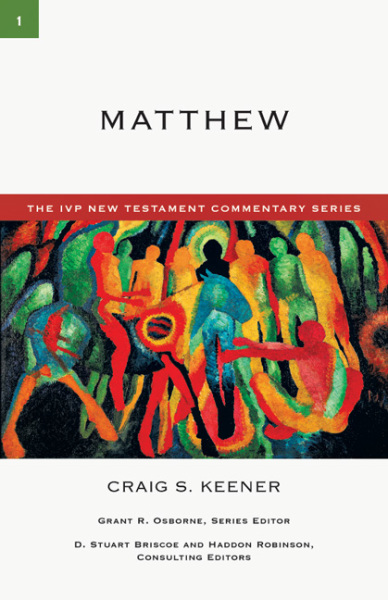
IVP New Testament Commentary Series - Matthew
Widely read among the early church for its focus on the teachings of Jesus, the Gospel of Matthew is uniquely suited as a guide for discipleship. Craig Keener expertly presents this first-century work as pertinent to modern believers as well by explaining Jesus’ teachings on how to live at any time.
Introductory materials describe the context of the gospel, including date and purpose, and a synopsis of significant theological issues. A detailed discourse then clarifies what Matthew meant to its first audiences, in order to comprehend what it should mean for us, today.
This outstanding commentary serves students, ministers, teachers—anyone who has a desire to know the message of Matthew in a more thorough way.
IVP New Testament Commentary Series - Philippians

IVP New Testament Commentary Series - Philippians
Nothing hinders a church’s witness—and its day-to-day existence—like conflict from within. Paul, in his letter to the church in Philippi, responded to a church body whose personal battles were worsened by outside hostility and adversity.
Paul thus chose to reinforce friendship and morality in his letter, along with their “partnership in the gospel,” their shared suffering for Jesus, and their essential duty to “stand firm in one spirit.” Paul’s advice is still strikingly relevant today.
Gordon Fee’s commentary describes this letter’s meaning for ancient readers, and how modern readers can apply it to their own lives.






- Adapt your commentary collection month-to-month based on the book or books you are studying.
- Build your commentary library strategically without hundreds of dollars of upfront investment.
- Never get stuck with commentaries you rarely use - swap them out each month as your needs change.



